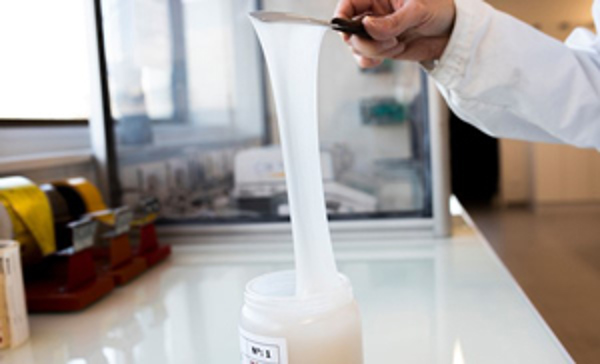What is a Silicone Compound?
A silicone compound is made up of a hydrophobic particle (generally silica) dispersed in silicone oil, which produces a foam control or antifoam agent used in a great variety of applications.

Chemical structure
The backbone structure of silicone oils is made up of a chain of alternating silicon and oxygen atoms. Each silicon atom is bonded to two carbon-based substitution groups, almost invariably methyl groups. Within the silicone oils themselves, the chains glide and slip over one another, so the oils are fluid. Silica particles are dispersed in the silicone oil to form the silicone compound.
Silicone compounds properties
The composition of the silicone compound has a determining influence on its performance and utility. Silica plays a key role in the formulation, to achieve exactly the antifoaming level required. The challenge is that the silica must be partly, but not completely, hydrophobic. The defoaming is triggered when an oil/silica droplet merges into the air-water interface, when the oil spreads across the liquid-air interface, which is destabilized (the bubble bursts) by the ‘pin pricks’ provided by the silica. Compared to organic defoamers, silicone antifoam compounds are more effective and so require very low dosage levels because silicone oils have lower surface tensions and so spread better across the liquid-air interfaces.
Why use silicone compounds?
Revision Sheet
Technology
Silicone Compound
Definition
Silicone antifoam compound consists of polydimethylsiloxane and hydrophobic particles (Silica).
General information
Silicone antifoam compound is a white to gray flowing liquid with 100 ~1,000,000 cSt viscosity, 100 % active content (silicone oil + silica).
Typical properties
Insoluble in water, low surface tension, very efficient to destroy bubbles in foaming media.
Structural units
Silicone compound: PDMS + Silica
Processability
The silicone compound could be formulated into an emulsion by using emulsifiers in order to destroy bubbles in aqueous media. The silicone compound can also be diluted in solvent when used in anhydrous media.
Application products
Pulp, Textile, Oil & gas, Agrochemicals, Detergent, Water treatment
Let’s follow the path of a bottle of plastic placed in a recycle bin. Once they arrive in a treatment facility the recycled plastics have to go through multiple process stages, where foam can be a real problem. For example, when PET (PolyEthylene Terephthalate) and HDPE (High Density PolyEthylene) containers such as water or milk bottles are recycled, they are washed at very high temperatures and flow rates, generating a great deal of foam. Silicone compounds converted into antifoam emulsions will provide a quick foam knockdown and long durability of the foam control. They are also appreciated for their good compatibility with different foaming medias.
Besides their long-lasting performance at low use levels (1 to 100 mg/kg), silicone antifoams are safe as they are chemically inert, they have a better resistance to heat and chemicals than ‘organic’ antifoams, they can be used across a wide range of pH range and are compliant with regulations.

Related applications
Our customers use compounds as antifoam emulsions for various industrial applications, including textiles, food processing, pulp & paper making, pharmaceuticals, water treatment, etc.
Related Products
Contact us
Take your business to the next level by partnering with a world-leading material manufacturer.